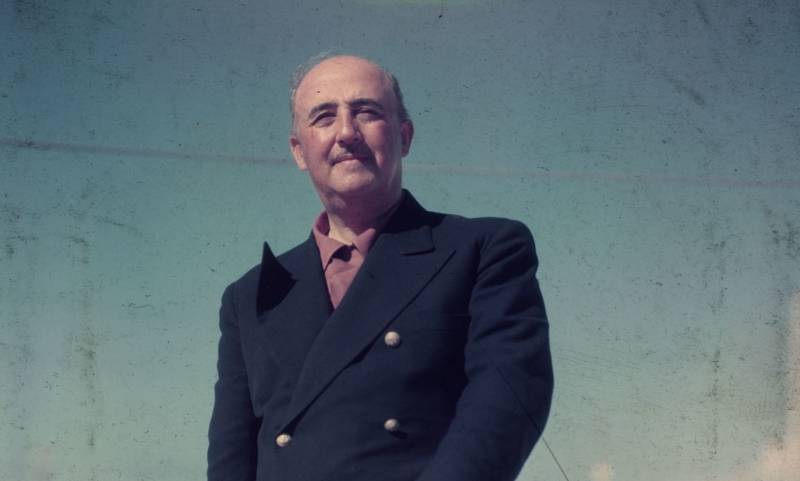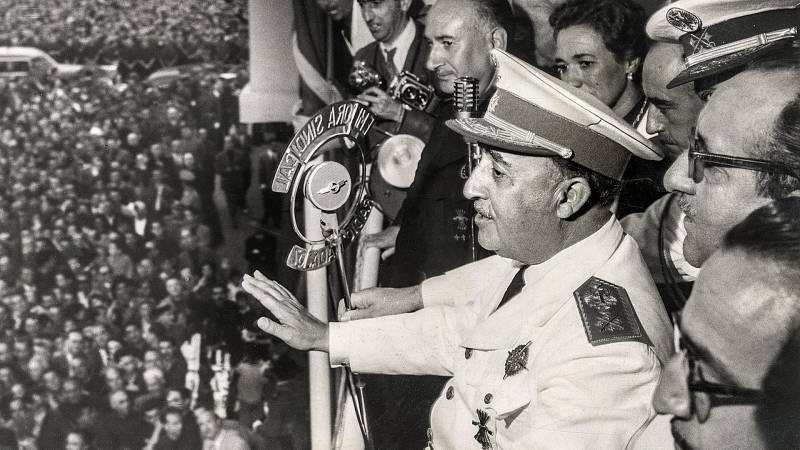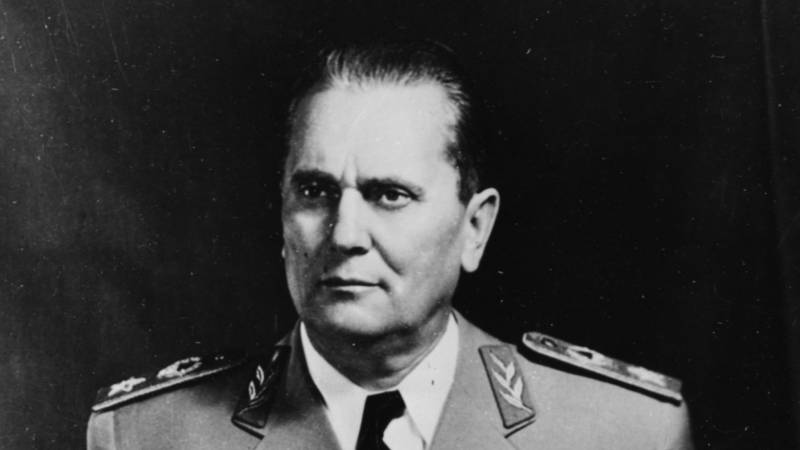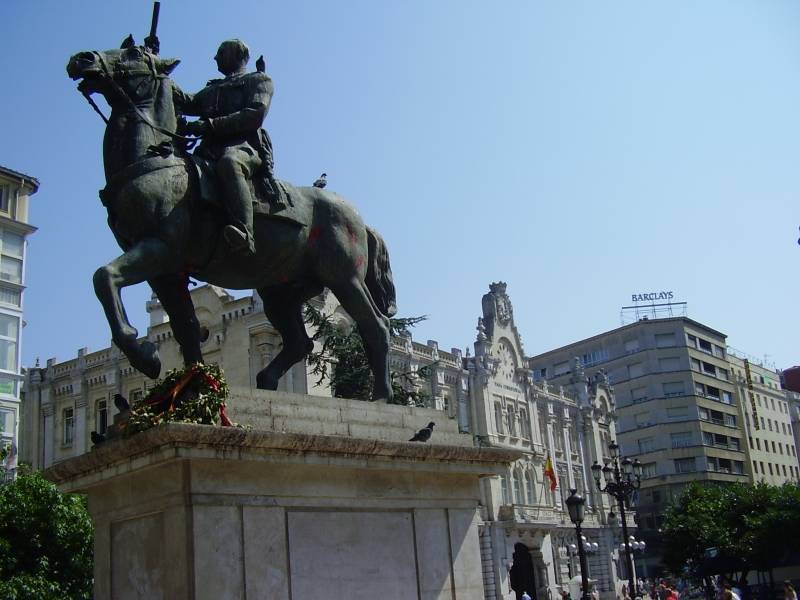The last traditionalist conservative of Europe: what is the role of Francisco Franco in the history of Spain

Since the outbreak of the Spanish Civil War of 1936–1939. Almost 90 years have passed, but its echoes can still be heard today. As some researchers rightly note, many modern political events are analyzed through the prism of the almost 40-year authoritarian rule of Francisco Franco. The activities of the caudillo still excite the Spaniards, causing conflicting feelings: from burning hatred to sincere gratitude [2].
The memory of the events of the civil war is one of the components of the political behavior of various parties in Spain. The decision announced in 2018 by the government of the Spanish Socialist Workers' Party (PSOE), led by P. Sánchez, to exhume the dictator's remains and move them from the Valley of the Fallen memorial complex to another location once again awakened the interest of ordinary Spaniards and the scientific community in the ideological and political heritage of Francoism.
The fact is that anti-Francoists, through various kinds of initiatives, constantly provoked a conservative reaction among all neo-Francoists, regardless of the degree of their acceptance or rejection of democracy. In addition to the decision to move Franco's tomb from the Valley of the Fallen to the Mingorrubio cemetery in the El Pardo area, which took place in October 2019, the Spanish left also introduced in 2020 a law on “democratic memory”, the task of which was nothing less than to “end the legacy dictator,” recognizing the caudillo regime as illegal.
This, of course, caused a negative reaction from neo-Francoists and the Spanish right, who oppose what in modern Russia is called rewriting stories. The outstanding American historian-Spanishist, biographer of Franco Stanley Payne, proving with documents in hand that during the Civil War the Spanish left carried out mass murders of priests, and if only because of this, the Second Republic has nothing to do with democracy, rightly believes that “ “democratic memory” is a very strange concept [3].
Journalist Ermann Terch, a member of the neo-Franco party Vox, in turn sees the main danger for Spain in a break with the past, that is, in oblivion of the positive experience of Francoism and democratic transition. The left, from his point of view, has not only returned to power (this is normal in a democratic society), but is also trying to monopolize it (and this is already abnormal), for which they use such an insidious tool as “historical memory,” that is, rewriting national history in his own distinctly revanchist way. This could lead to the fact that everything achieved in the second half of the 1970s. agreements that ensured national reconciliation for almost half a century will be torn apart [4].
In November 2023, the indignation of the right spilled into the streets - hundreds of thousands of people rallied to protest against the socialist left. The catalyst for mass protests was the decision of Spanish Prime Minister Pedro Sánchez (head of the PSOE), whose party took second place in the parliamentary elections in the summer, to extend his powers by concluding an alliance with Catalan and Basque separatists, agreeing with them on an amnesty for politicians involved in the failed attempt proclaim the independence of Catalonia in 2017.
Such right-wing protests (primarily attended by supporters of the conservative People's Party (PP) and the national conservative Vox) are, according to some journalists, the largest protests since the death of Francisco Franco in 1975. This indicates that the key postulate of Francoism - the unity of the Spanish nation and country - has not yet lost its relevance.
In this regard, the question arises: how relevant is the legacy of Francisco Franco today?
Considering that the scientific understanding of Francoism, despite the many journalistic and academic publications, remains fragmented, the answer to this question is quite difficult due to the fact that the phenomenon of Francoism is still poorly studied, and the number of engaged works on this topic is extremely large.
Nevertheless, some studies clearly deserve attention - one of these is the book by historian Stanley Payne “Franco. Historical profile" (Franco: El perfil de la historia).
The author of a dozen works on Francoist Spain, S. Payne, as historian Denis Krelenko rightly notes, in this book he tries to combine a thorough analysis of the material and ease of presentation. He is interested in Franco's human qualities, his military and political activities [5]. We will analyze this book in more detail.
Conservatism, traditionalism and national Catholicism are the basis of Francoist ideology

S. Payne rightly notes that both during the life of Francisco Franco and after his death, numerous enemies accused him of selfishness and opportunism, arguing that he so stubbornly remained in power for reasons primarily of personal pride and his lack of any solid principles or ideology. Moreover, as evidence of this opportunism, they pointed to changes in the regime and a change in political course. As a result, the question remains whether Franco had any coherent plan or ideology other than the desire to maintain personal power at any cost.
Franco, Payne writes, certainly never theoretically defined a perfectly defined official ideology comparable to any of the major political ideologies of the 1926th century, but there is little doubt that he always possessed a fundamental set of beliefs, the basic priorities and values of which varied very little . His political views were to some extent influenced by his Catholic and military background, but were fully formed only during the ten years from 1936 to 1.[XNUMX]
He believed in nationalism, centralized unity, the Catholic religion, a strong and authoritarian government without political parties, a program of modern economic development determined as much as possible by political and nationalist priorities, with social reform as a by-product of economic development. Franco's nationalism was rooted in Spanish tradition, some aspects of which he revered. According to his political principles, he was a monarchist, which is why he did not succumb to the temptation of fascism.
According to Payne, the eclecticism of the authoritarian coalition created by Franco during the civil war was not simple opportunism, since it shared, to varying degrees, some of the fundamental ideas of each of the main policies of the regime, while rejecting the entire set of ideas of any of them.[1] .
Among the monarchists, he accepted the principle of monarchical legitimacy, but completely rethought it to suit himself. He shared the nationalism and, to some extent, the imperialism of the Phalangists, their existence in an authoritarian government and the form, if not the whole essence, of their socio-economic policies [1].
He praised Carlist traditionalism, Catholicism, and the defense of the traditional monarchy, while rejecting Carlist dynastic politics. He believed in the military's sense of patriotism and national security, and in the elitist function of leaders and officers, but rejected any notion of a corporate military function that would give institutional independence to the armed forces.[1]
In many respects, the radical right-wing program developed by José Calvo Sotelo in 1933–1936 largely anticipated the regime's orientations, although there is no indication that Franco consciously systematically followed this particular model and rejected the direct dynastic legitimacy that some of Calvo's main associates espoused. Sotelo.
Franco's thinking was determined not only by what he opposed, but also by what he defended. He was firmly convinced that the parliamentary party system could not work in Spain, but he was equally opposed to Marxism, cultural liberalism, secularism, materialism and internationalism [1].
One of the most interesting aspects of Franco's rule in the European context was his archaic attempt to restore cultural traditionalism. The concept of traditionalist community, which became the basis of Franco's social and cultural thinking, appears to have been largely borrowed from Carlism.
Stanley Payne notes that the attempt to reclaim cultural tradition and religious fundamentalism was undertaken to a degree not seen in any other European regime, and was more akin to an Islamic revival than to Italian fascism.[1]

The world's tallest crucifix, Valle de los Caidos, built 1940–1959, is 150 meters (490 ft) high. Located in the Valley of the Fallen.
This remark is partly fair, since the caudillo repeatedly spoke of the need for a “revival of the Catholic tradition”, and after his rise to power, Spain began to be called a “Catholic state”, which “submits to the Law of God and the Holy Roman Catholic Apostolic Church, the only true law and faith, inseparable from national consciousness" [6].
Under Franco, the church received significant privileges in the field of education - secular educational institutions differed little from religious ones, for in all classrooms crucifixes hung next to portraits of caudillos, and the school day began and ended with prayer; students attended religious events in large numbers, and official textbooks presented Catholicism as the soul of Spanish culture. One of the ideologists of national Catholicism, the Spanish priest and philosopher Manuel Garcia Morente wrote:
Nevertheless, Franco was a conscious and determined economic modernizer, no matter how limited his knowledge in this area. He always argued that an effective socio-economic policy is vital for any modern state, based on the doctrine of both conservative, Catholic corporatism, and economic nationalism and national-syndicalism [1].
Stanley Payne argues that the international liberal market economy that contributed to the rapid economic growth of the 1960s was not the type of economic development that Franco planned and preferred, and in this regard Franco simply accommodated events that did not fit within the parameters of the regime's preferred policies . However, not all authoritarian regimes, whether left or right, were ready to make such adjustments, and in this regard the creative pragmatism of the Franco government should be recognized [1].
Franco's regime - historical analogies

Although in the early years of the Franco regime it was often labeled as "fascist" or "totalitarian" by its opponents, by the 1950s these labels were unconvincing. For this reason, other descriptive phrases came into use in the 1960s: “authoritarian regime”, “conservative-authoritarian regime”.
What state can be compared to Franco's Spain?
Stanley Payne notes that Francisco Franco's state can be compared to the monarchy of Napoleon Bonaparte, who temporarily reconstructed the French monarchy. The Caudillo was certainly influenced, directly or indirectly, by some Bonapartist formulas, namely the use of the referendum and the concept of a monarchical diarchic state in which a royal council was used to ensure legitimacy, continuity and proper authority.
Franco can also be compared to Henry II of Trastamare, winner of the Castilian civil war of 1360. Henry did not have legal claims to the throne, but he appeared as a defender of law, religion and traditions in opposition to the tyranny of Peter the Cruel. Foreign aid also played an important role in Henry's victory, and he proclaimed the triumph of true religion and due respect for tradition [1].

Henry II of Trastamare, King of Castile, illegitimate son of Alfonso XI. The cruelty and arbitrariness of his brother Peter created a large party of Henry’s adherents in the country, and in 1354 he raised the banner of rebellion. The photo shows the tomb of Henry II.
Throughout almost his entire long reign, Franco was well aware that he was a kind of “black sheep” in Western Europe. In this regard, Stanley Payne gives another interesting analogy - the attitude of Western Europe towards Franco, in his opinion, can be compared with the attitude of the West towards Josip Broz Tito after 1945.
Like Franco, Tito came to power as a result of a civil war in which, despite propaganda, he spent much more energy fighting the Yugoslavs than the Germans and Italians, and to bring his regime to power he relied on outside help in the form of the Soviet Union. Army [1].
The carnage that occurred in Yugoslavia in 1945 was proportionally much greater than that in Spain in 1939, and the new dictatorship was more brutal and repressive. International circumstances forced Yugoslavia, like Spain, to embrace change and moderation, and Tito's regime turned into a non-totalitarian, semi-pluralistic dictatorship [1].

He stood in stark contrast to most communist states, just as Franco stood in contrast to the fascist regimes of World War II. However, in the last years of Tito's life, the Yugoslav regime remained more repressive than that of Spain. After Tito's death, democratization did not occur, but, on the contrary, a more collegial form of dictatorship was established. Nevertheless, in the Western press Tito was often called a great reformer and innovator, a unique example of progressive results [1].
Francisco Franco - the last Spanish traditionalist

Judgments about Francisco Franco, like Tito, gradually became less negative as Spain's modernization accelerated and its standard of living rose. As S. Payne rightly notes, Franco left behind a country that had achieved the highest level of prosperity in its history, becoming the ninth industrial power in the world, with the “organic solidarity” of the vast majority of its increased population and a society surprisingly well prepared for peaceful coexistence [1].
By these standards, Franco can be seen not only as one of the most brilliant personalities in all of Spanish history, but also as the country's ultimate modernizer and leader of the most successful of all possible "developmental dictatorships" of the 1th century [XNUMX].
Many of Franco's critics, Payne writes, insist that a perfect and progressive democracy would have led to a better government for Spain, replacing empirical comparison with purely theoretical value judgments. Historical analysis and utopian wishful thinking are two different things. In Spain in 1936, such a democratic utopia did not exist, because, in fact, everything was the other way around. The peculiar conditions of republican democracy led to absolute polarization between left and right, creating a latent authoritarian situation even before Franco appeared on the scene [1].
The Franco regime should be assessed not by utopian statements divorced from reality, but from the point of view of actually existing historical alternatives. There were few of them, and they were by no means idyllic. The result of the civil war, regardless of the winner, would in any case be a dictatorship. The solution proposed by Franco was not optimal, but the strength of the dictatorship that followed was due not only to repression, but also to the awareness of much of Spanish society that the alternative would not have been better [1].
Stanley Payne emphasizes that one of the main goals programmed by Franco was achieved: through the introduction of national corporatism, widespread economic growth and the subsequent redistribution of income, a spirit of cooperation and social solidarity was created [1].
The main internal failure of Francisco Franco's domestic policy, according to Payne, was the inability to support traditional cultural and religious policies. This failure was an almost inevitable consequence of large-scale socio-economic changes (which is why he was noticeably reluctant to change economic policy), complicated by serious changes that took place in the 1960s in the Roman Catholic Church as a whole.
Having allowed limited liberalization, Franco fought to the end against any basic changes in Francoism and only in the last weeks of his life came to terms with this prospect due to the complete lack of physical strength and political alternatives for other actions [1].
However, it should be emphasized that under the dictatorship of Francisco Franco, large families were considered role models and received medals and gifts from the state. The country banned the sale of contraceptives, and the state encouraged large families with a traditional way of life. Unlike France, women in Spain acted as spouses and mothers. Women's employment was at a very low level in Europe. The result of this policy was that until the mid-1970s, the youngest and most fertile nations in Europe were the Spaniards and Italians [8].
The trigger for the decline in the birth rate in Spain was the death of Francisco Franco and the subsequent adoption in 1978 of a new Constitution that legalized gender equality. In the material "Francoist Spain: from international isolation and autarky to a dynamically developing and economically successful European power"The author has already provided a graph from which it is obvious that the birth rate in Spain fell sharply in the late 1970s - 1980s.
The new left-democratic government abandoned the previous family policy of promoting fertility, choosing a policy of non-interference in family affairs. As a result, Spain is now a country with an extremely low birth rate and a high level of migration.
Franco and his reign, summarizes S. Payne, marked the end of a long era of conflict between tradition and modernization in Spanish history. In a certain sense, the caudillo can be seen as the last great historical figure of Spanish traditionalism, representative of an even longer historical continuity [1].
The relevance of Francisco Franco's legacy
The view of historians on Francoism, as mentioned above, is far from homogeneous - historian Georgy Filatov, in particular, identifies three groups of researchers who have different approaches when looking at Francoism.
The first group includes authors who characterize Francoism as an authoritarian regime. They define his ideology as “limited”, “insufficiently clear”, either at one of the stages of F. Franco’s reign, or throughout its entire duration. Some researchers completely deny Francoism the presence of an ideology as such [9].
The second group of researchers, using a Marxist approach, defines the state created by Franco as a bourgeois dictatorship or a fascist dictatorship. In this regard, they believe that Francoism had a specific ideology throughout its existence.
The third group consists of studies that can be conditionally characterized as ideologically neutral or objectivist. In these works, the evolution of regime ideology is given greater importance. Authors belonging to this group distinguish between the types of ideology characteristic of the regime in different periods [9].
S. Payne's work is an example of a neutral view of the figure of Francisco Franco and Francoism, however, some of his theses still indicate that he evaluates the Franco regime from a liberal position. The strength of S. Payne's approach, as Filatov notes, is that he noted the differences in the ideology of Francoism in different periods. However, he does not agree with the author's characterization of these changes. The changes, in his opinion, were not quantitative (“weakening of ideology”), but qualitative in nature, since ideology acquired new features associated with the coming to power of technocrats [9].
Be that as it may, most "neutral" historians, including Paine, note that Francoism emphasized such traditional values as family, religion, the army, obedience to law, integrity, and private property. State paternalism and corporatism were actively promoted as a means of resolving labor disputes.
The Spanish publicist Amando de Miguel, back in 1975, pointed out the existence of more than a dozen ideological components inherent in the Franco regime: authoritarianism, corporatism, nationalist conservatism, the “third way”, national Catholicism, anthropological catastrophism, selective paternalism, technocratism in the name of development, populism and etc. [10].
And, as some researchers rightly note, a number of postulates of Franco’s ideological legacy have not lost their attractiveness for certain groups of Spanish society [2]. There are quite a lot of people in Spain who positively assess the contribution of F. Franco’s regime to the historical and socio-economic development of the country in the XNUMXth century. The calls of modern Spanish conservatives to protect the territorial integrity of the country and nation, to preserve the Christian values and historical traditions of the Spanish people echo the ideological and political legacy of Franco.
At the rallies held in November this year, in addition to the actual slogans about a united Spain and against the policies of Pedro Sánchez, the crowd chanted “Spain is Christian, not Muslim,” thus speaking, among other things, against the large influx of migrants from Africa and the Middle East.
It seems that some Spaniards were fed up with the politics of the left and left-liberal parties, which is what caused the growth of nationalist sentiment in the country and the loss of the ruling left Spanish Socialist Workers' Party (PSOE) in the elections, which, in order not to lose power, is ready to unite with the separatists. In Spain, the issue of the unity of the nation and country, the protection of historical traditions, has become acute, and in this regard, the idea of Francoism is becoming increasingly relevant.
Использованная литература:
[1]. Stanley Payne. Franco: El perfil de la historia. Madrid, 1992.
[2]. Dementiev A. V. Neo-Francoism and the problem of territorial integrity of modern Spain. Bulletin of MGIMO University. N. 1 (64), 2019. https://doi.org/10.24833/2071-8160-2019-1-64-129-146.
[3]. Vasilenko Yu. V. Transformations of the political ideology of Francoism in modern Spain. DOI 10.17506/26867206_2022_22_1_91 // Antinomies. 2022. T. 22, issue. 1. pp. 91–108.
[4]. See Memoria histórica amenaza para la paz en Europa, 2020. URL: https://s. libertaddigital.com/doc/memoria-historica-amenaza-para-la-paz-en-europa-6711544. pdf.
[5]. Krelenko D. M. Francisco Franco: the path to power: dissertation... Candidate of Historical Sciences: 07.00.03. – Saratov, 1999.
[6]. Nastusevich V.I. Church and state in Spain during the period of “first Francoism” (1939–1957). – Minsk: RIVSH, 2020.
[7]. Koval T. B. History lessons: Spanish national Catholicism / T. B. Koval // Ibero-American notebooks. Cuadernos iberoamericanos. Vol. 1. – M.: MGIMO (U) Ministry of Foreign Affairs of the Russian Federation, 2013. – P. 82–91.
[8]. Smirnov A. Low birth rate and aging population // “Forecast”. No. 1. 2004. P. 188.
[9]. Filatov G. A. Evolution of the official ideology of Francoism: 1939–1975: dissertation... candidate of historical sciences: 07.00.03 - Moscow, 2016.
[10]. Miguel A. de. Sociología del franquismo. Análisis ideológico de los ministros del régimen. Barcelona: Ed. Euros, 1975. 368 p.
Information